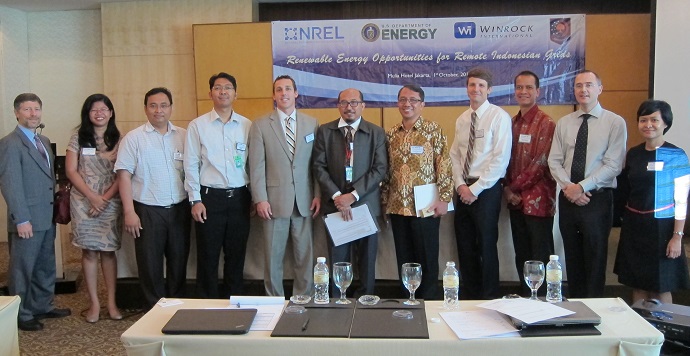15 October 2014
The Sustainable Energy for Remote Indonesian Grids (SERIG) project provides technical and economic analyses for high penetration of energy efficiency and renewable energy technologies to replace diesel electric generation on selected islands and remote grids. The SERIG project team is working with Indonesia government agencies, U.S. and international private sector partners and technology providers, and international donors and agencies to accelerate deployment of renewable energy and energy efficient technologies on selected islands and remote grids in Indonesia to optimize diesel fuel displacement and energy cost savings. The team held a workshop on 1 October in Jakarta to discuss renewable energy opportunities for remote grids in Indonesia. Key Takeaway from the workshop is an MOU presently being drafted between DOE and the utility, PLN.

The Sustainable Energy for Remote Indonesian Grids project team held a workshop on 1 October in Jakarta to discuss renewable energy opportunities for remote grids in Indonesia.
Event Presentations
- Welcoming Remarks, Robert Sandoli, U.S. Department of Energy (no presentation)
- SERIG Program — Background, Brian Hirsch, U.S. National Renewable Energy Laboratory (NREL) and Rob Hardison, Winrock International
- SERIG Program — Results and Opportunities, Kari Burman, NREL
- USAID, Retno Setianingsih, U.S. Agency for International Development (USAID)
- Renewable Energy/Energy Efficiency Deployment Strategies to Lower Generation Cost in Isolated Grids, Perusahaan Listrik Negara
- Opportunities and Challenges of Smart Grid Deployment, M.A.M. Oktaufik, Badan Pengkajian dan Penerapan Teknologi
- Distributed Power Development, Made Wiratman, GE
- Scaling Up Renewable Energy Access in Sumba, Pradeep Tharakan, Asian Development Bank
- Electricity Storage Technologies, Greg Long, Fluidic
- Renewables — Diesel Examples from Hawaii and Alaska, Brian Hirsch, NREL
- Technological Advances in Integrated Isolated Grid Systems, Budi Supomo, ABB
- PLN Grid Codes and Development of Small and Medium RE projects, Bill Meade, USAID-Indonesia Clean Energy Development
- Integration of Solar Technologies on Isolated Grids, N. Govindan, Sun Edison
- Microgrids: Trends and Opportunities, Y. Premchand, DNV-GL
- Green Prosperity Program Funding Facility, Fred Holloway, Millennium Challenge Account Indonesia
- SS-RE Projects Investment from Private Sector Perspective PT Sumberdaya Sewatama
- Financing Challenges for Renewables in Indonesia, Sarana Multi Infrastruktur
SERIG Publications
- Sustainable Energy in Remote Indonesian Grids: Accelerating Project Development
- Sustainable Energy for Remote Indonesian Grids: Strategies to Accelerate Nationwide Deployment
About SERIG
The SERIG process includes intensive data collection, techno-economic analysis, financing and policy considerations, stakeholder engagement, and human capacity building to prioritize development opportunities and reduce early project risk. This holistic approach, applied broadly across Indonesia, aims to establish a framework for national-level replication with the potential to transform the clean energy market. SERIG was formally launched on 7 March 2013 in coordination with U.S. agencies active in the Indonesia clean energy effort, including the U.S. Department of Energy, Millennium Challenge Corporation (MCC) and the U.S. Agency for International Development (USAID). The U.S. National Renewable Energy Laboratory—the operating agency of the Solutions Center—serves as the SERIG project team lead and Winrock International serves as the local lead with staff in Jakarta. SERIG is funded by the U.S. Department of Energy.
